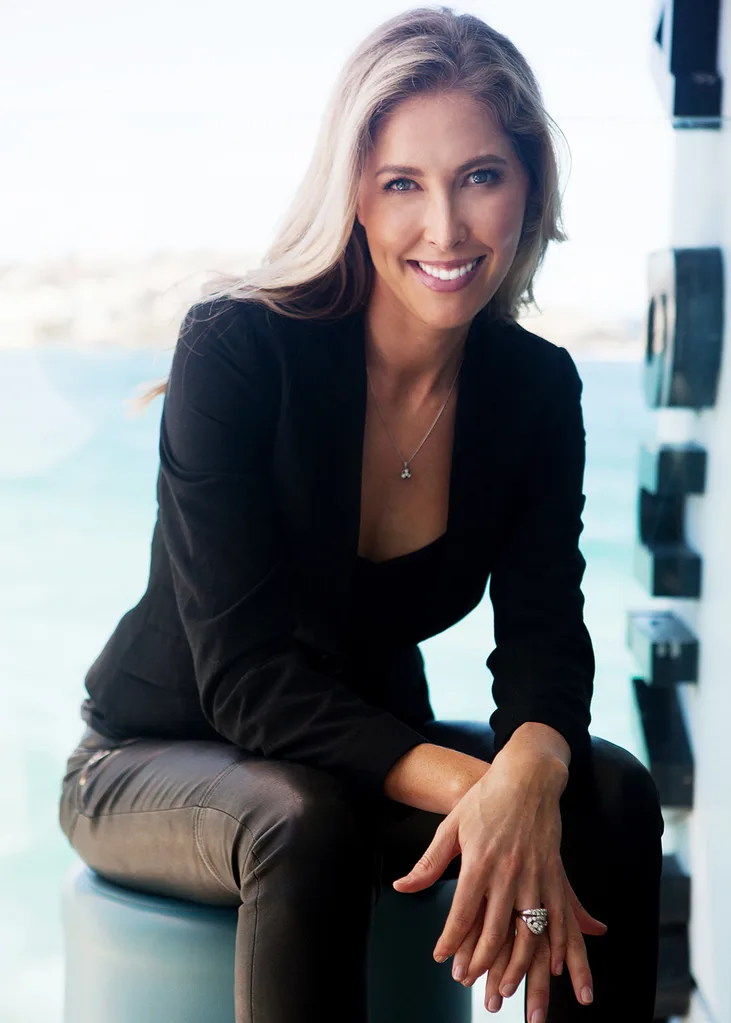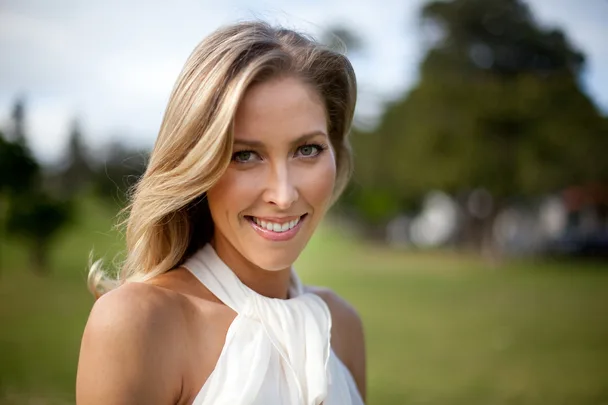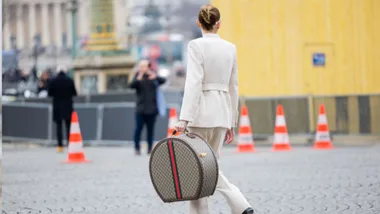If you asked any of my girlfriends if they’d think I would ever get post-natal depression, or anxiety and depression, I probably would have been the last choice out of our group. I’ve always been such an optimistic, positive, happy-go-lucky type of person and very calm. I think it shocked all of us. I didn’t even know what post-natal depression was before I copped a pretty severe level of it. I didn’t study it before I had the baby—I didn’t think there was any way I would get it.
Falling pregnant
I had a really good pregnancy; I was blessed because it took my husband Jay and I three and a half years to fall pregnant. In the last month, I had some insomnia creeping in, but I just passed that off on the fact that I was uncomfortable.
In 2015, I had a cesarean and my daughter Clara was born to one of my favourite songs I used to listen to in yoga, James McMorrow’s Higher Love. It was such a gorgeous experience, that full elation.
Then day three, when the milk came in, that was when my neurochemicals completely misbehaved and went berserk, and I became that one in five women who suffers post-natal depression.
The private hospital I was at send you down to the local hotel if they feel you are coping as a new mum. At that stage, I was struggling with breastfeeding but I wanted to go because that’s where all my friends went and I wanted to indulge in some nourishing food.
The warning signs
Clara was sleeping really well at the hotel, but I was awake all night, so that’s a huge red flag of post-natal depression, if the mum can’t sleep while the baby is asleep. That was purely from severe anxiety that was starting to bubble within me. Day three at the hotel, I was having premonitions of jumping off the balcony. I didn’t tell anyone about that premonition. I thought that was just absolutely crazy and ‘Don’t even think things like that’. But that was the catalyst looking back, when the darkness and the demons started.
Heading back home
When we went back home to Rose Bay, I was experiencing hyper-sensitivity to sound. I could not stand noise and everything was amplified. I would ask Jay to pop Clara into the kitchen just to leave her down at the other end of the house because I could literally hear her turning over in her little cradle.
Breastfeeding was excruciating. My nipples were bleeding, and I started looking to Clara as the source of my pain. My husband would bring her to me for a feed and I would quickly say, “Take her away, don’t put her anywhere near me”. That was a sign that another baby bonding issue was going on. I was crying every day and I just didn’t want to be around Clara because of it.
We put our baby girl on formula—an organic one— at three weeks. Jay and I are really health conscious and we eat organic and we knew that breastfeeding was great, so it was this huge battle in my own head as those feelings of shame, guilt and failing as a mother were all coming up.
I still hid behind this veneer and every time I went out to meet anyone I would be perfectly groomed, and I was telling everyone that I was doing okay. I wouldn’t even tell my husband. I would catch myself in the mirror going, ‘Just hold on, be strong,’ with tears streaming down my face.
My mum was with me for the first six weeks, she was a legend, doing cooking and cleaning and helping me look after Clara. So every time I would cry she would say, “Don’t worry darling, everyone cries, it’s just the blues”. That’s another thing; if you are crying every day for more than a week or two weeks, that’s not the blues, there might be something more going on there.
Then mum left and I experienced so much more anxiety, sadness, crying and the whole thing of ‘I’m not getting it as a mum’.
At six weeks, I tried to go back to work. I went to business meetings and I had a blow dry and my leather pants on and was like “Okay guys, I’m totally ready to come back to work,” even though on the inside I was just completely crumbling.
My lowest point
In week eight, the exhaustion took over, and I fell into a really big depression. I was due to be in Scotland at a wedding for my best friend, as a bridesmaid, and so I was ready to leave Clara for a week. I had my bags packed, I exchanged my money and on the way home from the money exchange I suffered this huge panic attack.
I thought, ‘How could I leave Clara behind, how can I even be a mum?’ Then the thoughts lifted from ‘I need to escape,’ to ‘I hope the plane goes down on my way to Scotland, that will be the best outcome for everyone’.
That’s when I started Googling on my phone ways to end my life. That was a pretty intense moment, and looking back it was completely irrational, a completely chemical imbalance. It gave me such amazing insight into suicide, what people are actually going through in terms of convincing themselves that the acts that they are going to carry out—and the people that are left behind—will thank them for doing it.

Are you okay?
I arrived home to my husband and he looked at me and he was the one that asked me those beautiful three words: “Are you okay?” And those three little words that can be so simple—that contain everything—they really saved my life.
I said: “Darling I’m absolutely not,” and told him how I was feeling, my headspace, and what I was planning to do. He reassured me that his life would never be the same without me, and that he needed me and loved me.
That’s when we called in the professionals and I got admitted to a post-natal depression unit that day. Thank God my husband was there when I came home; it could have ended much more badly than me in hospital.
Seeking treatment
I spent five weeks in the post-natal depression unit and I met the most incredible women: lawyers, surgeons, property developers—all very high functioning females—who had crumbled.
I felt like I was a part of this tribe, and we’d swap stories like, “Don’t worry I’m a barrister and I haven’t brushed my hair for three months”. So you start having a laugh and it softens the severity of the situation. I went off of all social media while I was there, just trying to focus on what was really important to me.
Looking to the future, my goals changed. To what I wanted to have and to how I wanted to feel, which were feelings of peace and calm. That looked like me changing career paths and starting to study psychology and neuroscience, and to learn meditation and mindfulness. I’ve done some serious hard work on my internal self and to treat my body and brain with the utmost respect. I’ve become a much calmer version of my old self.
Now, I’m a community ambassador for RU OK. It gets you outside of your own head, out of your ego and it puts things in perspective. If you notice someone starting to isolate themselves or a change in their behaviour, just by asking, “Are you okay?” or “How are you doing, how’s your heart at the moment?” can literally change someone’s life.
I often think, ‘Oh my gosh, I’m so lucky to be alive’. I’m so pleased that I chose to breathe that day and not die.
Symptoms of post-natal depression include:
- Low self-esteem and lack of confidence
- Feelings of inadequacy and guilt
- Negative thoughts
- Feeling that life is meaningless
- Feeling unable to cope
- Tearfulness and irritability
- Difficulty sleeping or changes in sleeping patterns
- Low sex drive
- Anxiety, panic attacks or heart palpitations
- Loss of appetite
- Difficulty concentrating or remembering things.
You can find support and more information at PANDA (Perinatal Anxiety & Depression Australia) or by calling 1300 726 306.
R U OK Day, held on September 14, is a day dedicated to reminding people to ask family, friends and colleagues the question, “R U OK?”. If you or someone you know needs help, visit ruok.org.au, Beyond Blue, or call Life Line on 13 11 14.










